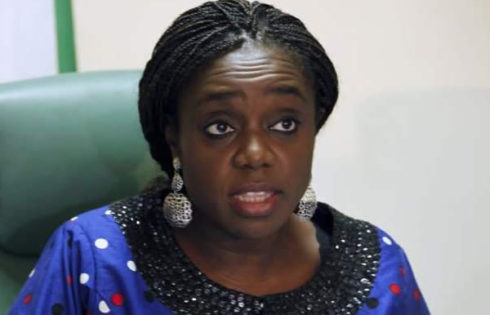
 As the Central Bank of Nigeria’s Monetary Policy Committee concludes its meeting in Abuja, the Minister of Finance, Mrs. Kemi Adeosun has urged the apex bank to cut interest rates to boost domestic borrowing by the government.
As the Central Bank of Nigeria’s Monetary Policy Committee concludes its meeting in Abuja, the Minister of Finance, Mrs. Kemi Adeosun has urged the apex bank to cut interest rates to boost domestic borrowing by the government.
However, the MPC which started meeting yesterday is widely expected to hold rates as the country struggles with recession and high inflation.
Adeosun in an interview with CNBC monitored in Abuja, noted that lower interest rates will allow the government to take on more local loans without increasing the burden of debt servicing.
The Minister who expressed confidence that the government can spend its way out of recession, however warned that the import driven nature of the economy means the challenge of foreign exchange will be difficult to resolve.
She said she is working with the Debt management Office, the Sovereign Wealth Fund and the pension industry to issue an infrastructure bond to raise money for road and housing projects.
According to her, what hurt the economy more is the high is the high interest rates. She therefore asked the CBN to reconsider its July interest rate increase, which it implemented to help support the naira and attract foreign investment.
She said: “We need lower interest rates. If we drive the economy and there is growth, that is the payback. I would rather seek growth, we can manage inflation, let’s stimulate the economy.
“Our economy is largely import driven so we are always going to have problem. At the moment we still have two rates for the Naira, it needs to be resolved; we need to narrow the spread. We need to move from a consumption led one, if Nigeria just does what it says it will do, which is investing in infrastructure and ease of doing business, it will be fine”, she explained.
She added: “We need lower interest rates, because when we are borrowing and interest rates go up, it increases our cost of debt service and it reduces the amount of money that is available to spend on capital projects”.
She said government has received commitments to its planned $1 billion Eurobond from international investors, which it aims to issue before the end of the year, but pricing will be key.
The Federal Government is seeking advisers and bookrunners and is currently accepting proposals from international and local banks for the bond sale.
Standard and Poor on Friday lowered Nigerian sovereign rating to B from B+, owing to marked contraction in oil production, restrictive currency regime, delayed fiscal stimulus.
“We already have quite strong indications and indeed we had some commitments. Even though we weren’t doing a deal we already have commitments to our bond offer, so we are very confident that it is just a question of pricing,” Adeosun said.
